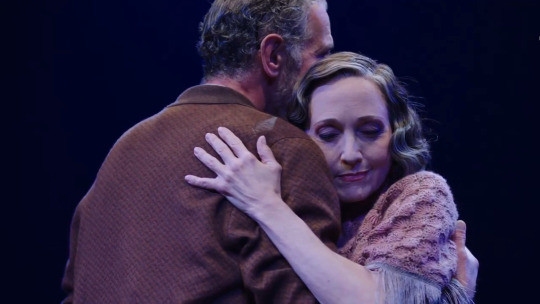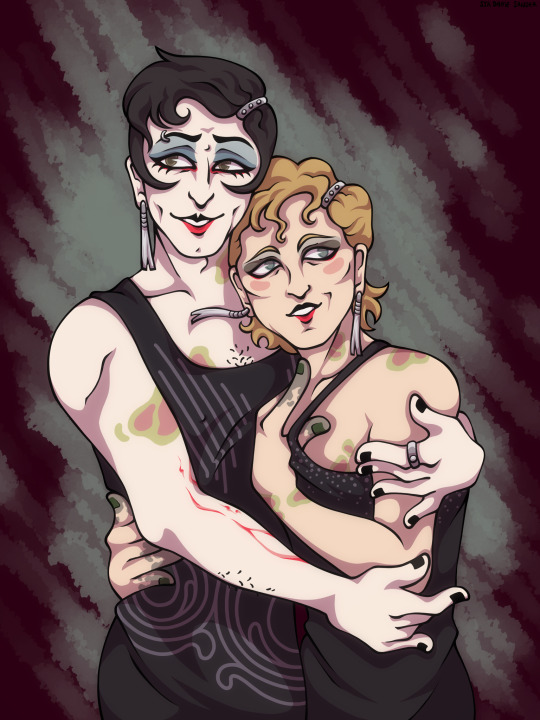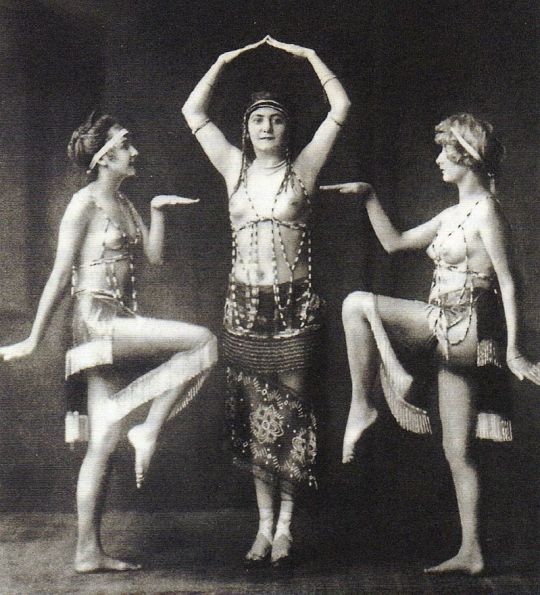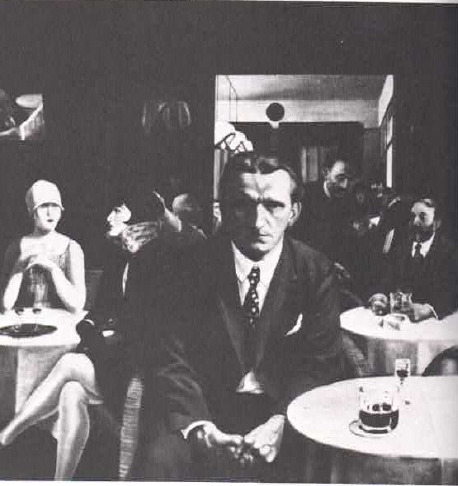#cabaret berlin
Text

Voo Doo, a German trans woman cabaret owner and performer with her beloved boa. (Date unclear: likely 1912-1928.) [source]
14K notes
·
View notes
Text

Jeanne Mammen Carnival Scene. 1928. Pencil and watercolor on paper: 42 × 30 cm (16 × 12 in). Originally appeared as Sie repräsentiert! in Simplicissmus magazine, issue 47, 1928.
#1920s#berlin#cabaret#gender#art#culture#lgbtq#damenklub#women artists#jeanne mammen#lesbian#art history#feminism#women#gay#pride#people#lifestyle#queer#fashion#🎩#bob fosse#🎬
304 notes
·
View notes
Text

In December 1930, Christopher Isherwood finally settled into an apartment, at Nollendorfstrasse 17 in the Schöneberg district. He lived there with Jean Ross, the model for his most famous character, the capricious nightclub singer and aspiring actress Sally Bowles, who captivated him with her “air of not caring a curse what people thought of her.”
From "Looking for Isherwood’s Berlin" By Rachel B. Doyle, New York Times article, April 14, 2013
59 notes
·
View notes
Text
"Welcome to the Theatre": Diary of a Broadway Baby
Cabaret
April 24, 2024 | Broadway | August Wilson Theatre | Evening | Musical | Original | 2H 45M + 1H preshow

I am kicking my feet and twirling my feet as I lovingly, tenderly, reverently carve Bebe Neuwirth's name into the Tony personally.
Bebe Neuwirth Verdict: My Soul Transcended Space and Time
A Note on Ratings
Oh. The rest of the show. Right.
Cabaret is one of the greatest pieces of musical theatre to exist. I have seen four productions of this show on multiple "levels" of production (Broadway, community, regional, etc.) The show being what it is, it seems inconceivable to ever stage a poor production of a show with such rich material. Even if the talent pool came from a small town, the music, the lyrics, the story would be so strong, so moving, so timeless, that nothing coupled possibly ruin it.
I was wrong.
The fifth Broadway revival of this beloved Kander and Ebb musical is a stagnant spectacle whose price tag seems to actively encourage its potential audience to pick up their knitting, their book, and their broom, because the holiday of the Kit Kat Club is only meant for the rich denizens of society. Helmed by a director with no prior experience in musical theatre, the show fundamentally mistrusts its audience's intelligence and the once-masterful subtext is now about as subtle as a brick through a fruit shop window.
It's a bad sign when the security staffer at the entrance line tells you the design is excellent, the visuals are excellent, "the show is...good," with pointed hesitation and eyebrow raising. What would we do without New York honesty?
Under this new "immersive" direction, patrons enter through a seedy back alley door (with too many steps, which granted, they did warn me about before and I should have listened) and into a massive three-story club design with pre-show entertainment and drinks galore. With limited seating and rather underwhelming acts, my disabled ass went to my seat in the theatre instead where the whole auditorium has been gutted and renovated to create a theatre-in-the-round setup that ultimately does not suit the staging. Instead, actors play primarily to the "east" side, leaving the "west" to see a lot of backs throughout.
As characters, the Emcee and Sally are deranged, clownish, and utterly devoid of layers and complexity. They are exactly what their outlandish costumes, garish makeup, and overwrought performances say they are: too much. Eddie Redmayne is going for some kind of demonic muppet clown portrayal. This interpretation fails to do what the character is meant to do. Seduce, entice, enchant, all of which can be done in a morbid or even unsettling way, but Redmayne only ever irritates and repels. Similarly, Sally is an easy character to misunderstand. She's seemingly vapid, ignorant, and concerned with nothing more than having a good time. She's a character on the verge, but only ever on the verge. Too often I have seen performers act out the titular song as a full-blown breakdown. It is not. It is a triumph. It is a discordant celebration as the rest of the show falls into despair. In directing all of Sally's numbers to be as hysterical, unhinged, and off-putting as they are, it's clear the director, the producers, and to an extent, the actress who went along with it, do not understand this character, this story, this world. Less is more. Trust the material. Trust the audience.
Cabaret is a racy show with plenty of lewd and lascivious content. But this production takes the graphic nature to an extreme that ultimately misses the mark. Instead of a seductive coaxing, or even a morbid eroticism, we're granted such overt choreography (a man jerks off a giant black phallus into a woman's mouth, a woman mimes raining her tit milk all over a man's face, a woman graphically masturbates to Mein Kampf) that it becomes a juvenile display. Like children who make sexual jokes to be edgy, but only ever sound immature. It's off-putting, it's annoying, it's dull. There are multiple rewrites to the "Willkommen" introduction schtick, and the new lines are such a downgrade.
There are moments of relief amidst the spectacle that somehow still lacks spectacle. Bebe Neuwirth is a wonder of wonders, and her chemistry with Steven Skybell as Herr Schultz is a miracle of miracles. They are the saving grace of this monstrosity. Age, experience, and deep connection to the writers and the show give their performances a joyous, heartbreaking, beautiful tone. They are real, they are grounded, and they will shatter your heart. These scenes are the only places the director shows she's capable, perhaps because she has only ever done dramatic straight plays. The decision to stage "Married" as a trio with Kost spot-lit and singing in tandem was simple and brilliant and poignant. The way this show is meant to be. "What Would You Do?" is staged perhaps a little oddly, given the director's inability to remember she's doing an in-the-round show, but Bebe's rendition is the best I've ever experienced. I have heard this song sung beautiful by stronger singers, many who still grasp the acting well, but none hold a candle to her. This is a woman who has torn out her own beating heart from her chest as she chooses safety and self-preservation, even if it breaks her. This is a woman who is old and tired and not brave. Who has been given this one moment of happiness in her life and she has no choice but to saw it off like a gangrened limb before it poisons her entire body. Schultz and Schneider are the heart of this show. They deserve better.
It's been said by others, but the issues with this production seems to stem from its creative team's fundamental misunderstanding of Jewish culture. The show was written by three Jewish men who understood what was at stake. They had all lived through WWII. This is a production with a distinctly English tone, directed by gentiles, for gentiles. Broadway and New York, more familiar with Judaism than perhaps the West End, clearly received this revival differently.
Final Verdict: A Long Slog to Curtains
A Note on Ratings
#cabaret broadway#broadway#musical theatre#welcome to the theatre: diary of a broadway baby#bebe neuwirth#if i were a tenant of her building i'd be showering her with the finest fruits in all of berlin every day
17 notes
·
View notes
Text
Some stuff about queer culture in Weimar Berlin
Note: Das Institut für Sexualwissenschaft does not have a definitively used translation from what I see -- have seen Institute of Sexology (my preferred translation), Sexual Science, Sexual Research, Sexual Knowledge etc. It’s all the same place.
any further suggestions, feel very welcome to add!
*
ONLINE:
the wikipedia for the institute: yeah, yeah it’s wikipedia, but get some groundwork done here if you know nothing at all, so the next set of recommendations don’t overwhelm you
Remembering Dora Richter, One of the First Women to receive Gender-Affirming Surgery: good introduction to the Institute of Sexology, with a focus on one of the women who lived, worked, and received care there
On the Clinics and Bars of Weimar Berlin: a more in-depth article about the institute, some of the people who sought to get support via it, and the surrounding culture of the time
The Magnus Hirschfeld Society: a lot of their work is published online, in German, French, and English. Hours of fun.
Interview with the author Laurie Marhoefer: discussing his book (mentioned below) Sex and the Weimar Republic, which focuses on various fronts to sexual liberation in the Weimar Republic, including the limitations of assimilationist approaches*
*Marhoefer is currently working on their third book centred on queer persecution during the Third Reich, which “centrally analyzes racism as a vector of persecution,” so that’s something to keep an eye out for too
The Asian Canadian gay activist whose theories on sexuality were decades ahead of their time: an article about Li Shiu Tong, by Marhoefer, who also wrote a book about him (see below). The title really says it all
The Transvestite Magazine of Weimar Berlin: a series of magazines that were published until 1933 when the crackdown on queer rights resulted in the destruction of the Institute of Sexology, featuring examples of voices almost completely overlooked -- transvestites who were simply living their lives
The Institute for Sexualwissenschaft: this blog post goes into something I’ve been thinking as well -- the parallels between the anti-queer/anti-trans violence perpetuated by the German government before, during, and after the Nazis and the anti-queer/anti-trans rhetoric and violence today. Where would we be if all that research had survived? (and luckily, some of it has!)
*
BOOKS
Der Liebe und Dem Leid: Das Institut für Sexualwissenschaft 1919-1933: a recent German historical account of the institute of Sexology that I desperately want to get my hands on
Sex and the Weimar Republic: German Homosexual Emancipation and the Rise of the Nazis: explores intersectional fights for queer emancipation during the Weimar Republic and its limitations
Racism and the Making of Gay Rights: A Sexologist, His Student, and the Empire of Queer Love: goes deeper into the story of Li Shiu Tong, who was an impressive researcher at the institute and whose contribution to sexual and gender philosophies is being reconsidered at the moment!
Magnus Hirschfeld: The Origins of the Gay Liberation Movement: a biography of Magnus Hirschfeld and his central role in the queer liberation movement of the time
The Masculine Woman in Weimar Germany: looks at the depictions of women who didn’t conform to standard gendered and sexual expectations from 1918-1933 and explores their role to understand gendered lives and experiences at this point in German history
The Hirschfeld Archives: Violence, Death, and Modern Queer Culture: a book I desperately want to read on anti-queer violence in the early 20th century, focusing on the Institute of Sexology and its destruction, which has gathered archival material from “over a hundred published and unpublished books, articles, films and photographs.”
Gay Berlin: Birthplace of a Modern Identity: another broader book about Berlin. I’m interested in the subtitle “birthplace of a modern identity” as potentially exploring the ways Berlin was the centre of explorations that despite the Nazis best efforts are still alive and -- with setbacks -- remembered today
Queer Identities and Politics in Germany: A History, 1880-1945: Idk what to tellya it’s about queer identities and politics in Germany between 1880-1945
*
ISHERWOOD
British author Christopher Isherwood spent some time in Berlin, notably including a stay at the Institute of Sexology. This time resulted in “The Berlin Stories,” as well as a section in “Christopher and his Kind” (his autobiography).
These stories were turned into the play+film “I Am A Camera” and the musical+movie “Cabaret”
The 1993 Alan Cumming and Jane Horrocks Cabaret (one of my favourite things in the world)
Opening of the 1972 movie
(according to a 1977 biography of Isherwood, he denounced the Berlin Stories in a 1956 essay: “He regretted depicting many persons as "monsters" and noted they were "ordinary human beings prosaically engaged in getting their living through illegal methods. The only genuine monster was the young foreigner who passed gaily through these scenes of desolation, misinterpreting them to suit his childish fantasy."” -- that being said, the people in those books are still very, very interesting and -- despite Isherwood’s initial limitations/biases -- beautiful in their realities)
*
OTHER MOVIES
Anders als die Andern and Laws of Love -- two movies produced via the institute exploring same-sex relationship rights. I haven’t seen the latter yet (it was only restored in 2021, nearly a hundred years after it was released), but it was heavily censored. The former (with the famous German actor Conrad Veidt as a lead) is considered the first movie to overtly show homosexuality. They’re both on the Internet Archive
The Einstein of Sex: Life and Work of Dr. M. Hirschfeld: by cult film-maker Rosa von Praunheim that explores the opening of the institute up until the 30s. I haven’t seen it yet, but very excited! EDIT: currently watching and it’s definitely On A Budget, but a good rundown of Hirschfeld’s life. On youtube with english subs. EDIT 2: having finished it, am interested in how it portrayed Dora Richter (that it had her in it at all was great) -- not completely accurate, but a labour of love
Paragraph 175: a 2000 movie documenting some of the gay men who experienced the violence of the law under Nazi regime and afterwards. This film is simply made, and there aren’t many men featured in it -- it feels like it’s trying to get the story told before they lost their chance completely. The stories are very brutal. It starts pre-war. One of the men talking is the French author Pierre Seel, who lived until 2005 and received recognition as a holocaust survivor in 2003, in part due to this film and his own memoir
Great Freedom: this actually takes place post-war, but another insight into what Paragraph 175 was. the main character was in a concentration camp, but it’s not depicted. I simply think it’s good, although it’s mildly off-topic.
*
MISC
this has focused a lot on the Institute of Sexology, but I’d like to read some works on Helene Stöcker and the World League for Sexual Reform
#resources#queer stuff#queer resources#weimar berlin#magnus hirschfeld#li shiu tong#laurie marhoefer#heike bauer#paragraph 175#die institut für sexualwissenschaft#weimar germany#cabaret#christopher isherwood#queer history#queer germany#germany#queer literature#queer non-fiction#queer cinema
164 notes
·
View notes
Photo

Adolf Uzarski, Kabarett Café, 1928. Watercolor on paper, 70x40 cm. Dusseldorf, Stadtmuseum.
#adolf uzarski#neue sachlichkeit#cabaret#1920s#magic realism#new objectivity#Weimar Republic#Babylon Berlin#Düsseldorf#1928#1920s nightlife#modern art#1920s germany#modernism
104 notes
·
View notes
Text

Cabaret girl, Berlin, 1920s. Model and photographer unknown. Photo property of Susan M, source Etsy.
27 notes
·
View notes
Text
youtube
At the Source: Goodbye to Berlin by Christopher Isherwood
(ERRATA: The video pre-roll was accidentally muted. Everything else is fine.)
Will the real Sally Bowles please stand up?
Thank you to our top-level Patreon Supporters!
Midnight Musicals
midnightmusicalspod.com
Twitter: @MMusicalsPod
IG: @MidnightMusicalsPod
Visit Musical Hell at:
http://MusicalHell.com
Support me on Patreon and Ko-Fi!
http://www.patreon.com/user?u=235731
https://ko-fi.com/musicalhell
Follow me!
@MusicalHell
musicalhell.tumblr.com
facebook.com/divasmusicalhell
For more reviews, commentary, and general awesomeness of every kind, visit:
rtgomer.com
10 notes
·
View notes
Photo

The Cabaret Series 08 (2023)
57 notes
·
View notes
Text

only yesterday I said to her, “I want you for my wife.” and she said, “your wife? what would she want with me?”
#god I love them. worlds most problematic girl best friends#‘what’s up w sally’s fingers?’ little treat for the goodbye to berlin readers. iykyk#sanders art tag#cabaret#musical theatre#fanart#sally bowles#emcee#I think this is the first time I’ve drawn natasha richardson sally. usually I draw his random lady I saw in some tiny 40 seater#she’s got a fun face to draw#alan cumming I can do a perfect likeness from memory at this point let’s be real
23 notes
·
View notes
Text
I am a camera with its shutter open, quite passive, recording, not thinking... Some day, all this will have to be developed, carefully printed, fixed.
Christopher Isherwood, Goodbye to Berlin
24 notes
·
View notes
Text

Christopher Isherwood
#christopher isherwood#cabaret#a single man#gay history#male style#literature#gay literature#gay life#lgbt#lgbtq history#lgbt history#vintage men#vintage fashion#goodbye to berlin#berlin
55 notes
·
View notes
Text
Just came back from Stuttgart Staatstheater‘s production of Cabaret and my first impression is that it was really dirty (in a positive and lovely way) but underwhelming in presenting the apocolyptical feeling that is the end of Weimarer Republik in comparison to other productions (London, Baden, maybe also Chemnitz from what I have heard). BUT, it is the kind of production that the more you think about it the more you realize how serious and grounded the sutle social commentaries are.
How this production deals with Tomorrow Belongs to Me/tbtm (a fictional Nazi propaganda music written by its jewish componist) is really really different from the other versions I personally have seen.
So, often, this music will pop up twice in Act I. The function of the first time would be to present the allure/charm of Nazism, its aesthatic and its feigned progressiveness, then The Emcree will mock it. This can be achieved by only singing the first two stanze of the song (just leave the VATERLAND part out), where the lyric is fairly unalarming and just nice to the ear, combined with having a harmony or a children's chorus sing it. The more beautiful and innocent this tbtm was, the scarier the reprise of it would be at the end of Act I. I also enjoy this kind of design, because it forces the auience to fight their own appreciation of the aesthetic and it is not that easy, you WILL catch yourself humming the melody unconsciously after the show and you will want to slap yourself for it. Because of how asthetically appealing this propaganda is shown, a huge group of esemble singing the full version of tbtm at the end of Act I also makes sense. People are drawn to this horrible thing, the audience can understant it because they would also feel the pull.
HOWEVER, in the Stuttgart production, tbtm was presented as underwhelming and unimportant, even quietened by Ludwig (that explicitly anti-semitic Nazi guy) after Kost sung it ALONE at the end of Act I.
The Stuttgart production of Cabaret doesn't go for the 'Nazi is asthetic pleasing/brainwashing' route for making sense of why would Weimarer Republik spiral into Nazi-Germany. It make the audience notice the chilling fact/warning that turning to right-populism can a case of making horribly wrong decisions for the right reason.
The character of Kost, the nazi sex-worker living in Frau Schneider's appartment, get alot more depth an nuances in this production. She get more stage time and also a new number, which is I Don't Care Much. Yes they move this song to the first Act directly after Frau Schneider threaten to evict Kost for bringing in the sailors. Kost acts like an asshole like in most productions, but the following number makes it clear that she was feighning her cheerful bastard personality. She doesn't enjoy sex-work and is always tailed by hunger and homelessness.
Her interaction with the jewish tenant Herr Schutz was also not explicitly enti-semitic. She did not evoke the stereotype of the greedy jew like in most production (and the original script), but insteat made a social commentary on how now in this world everything is about doing business and making money. For me this is her clear resentment towards capitalism, exploitation and inequality, which is a huge problem in Weimarer Republik. Because of this characterization of Kost, her singing tbtm ALONE at the end of Act I then being shushed by the explicit Nazi Ludwig is also very nuanced. The scene might feels underwhelming in comparison to other productions, but the constellation is clear: a proletarian suffering under capitalism full of hatred turns to right-extremism, and the right-extremist, while fully aware of the usefulness of rightpopulism, does not like how vocal she is with HER agenda.
Is Kost a lovable character in this production? No.
Is her turning to Nazism a right decision? Hell no.
Is her discontent with the economic system justified? Yes
Is her radicalization understandable? ...Yes
I never liked the simple 'nazi bad ppl were just brainwashed because propaganda was just that good' reasoning for why Nazi-Germany happened. The nuance of how rightpopulist political group exploits the ideology cultivated by (neo-)liberals and libertarians that their is no alternative ecnomic/socio-cultural system beside capitalism should be more present or become a common sense.
The choice of how to present the appeal of Nazism - through music or narrative - is also worth thinking about. The Stuttgart production seems to be intentionally avoiding the asthetic route. tbtm was actually presented twice in Act I. Besides Kost's solo number in the end, their is also this lovely lady/drag-queen Lena aus Essen playing it on a violin rather POORLY. Lena then said: "you weren't expecting this, right?" It is as if the production is encourage the audience to turn their attention to the mundane part of the dangerous (almost sensual in some hollywood films) appeal of Nazism presented by Kost: One would think that a party which doesn't dismiss their suffering and hatred like the current one, and even agrees with their irrational xenophobic/enti-semitic sentiment instead of trying to correct it like the current one, would eventually make their life better.
p.s. I remeber that in the original book Goodbye to Berlin by Isherwood there are actually some communist characters, also scenes about how they ran their activities in underground bars, and of course the indication of their terrible ends when the nazi got into power.
8 notes
·
View notes
Photo

Anita Berber and the Decadence of Weimar Germany’s Berlin (20s)
236 notes
·
View notes
Photo

Distel Cabaret Theatre, 101 Friedrichstrasse, East Berlin, 1961. From the Budapest Municipal Photography Company archive.
68 notes
·
View notes
Photo

Otto Griebel, Self-Portrait, c.1927
#Otto Griebel#neue sachlichkeit#new objectivity#Weimar Republic#Babylon Berlin#painting#modern art#modern painting#modernism#1920s art#1920s#cabaret#bohemian#1920s germany
30 notes
·
View notes